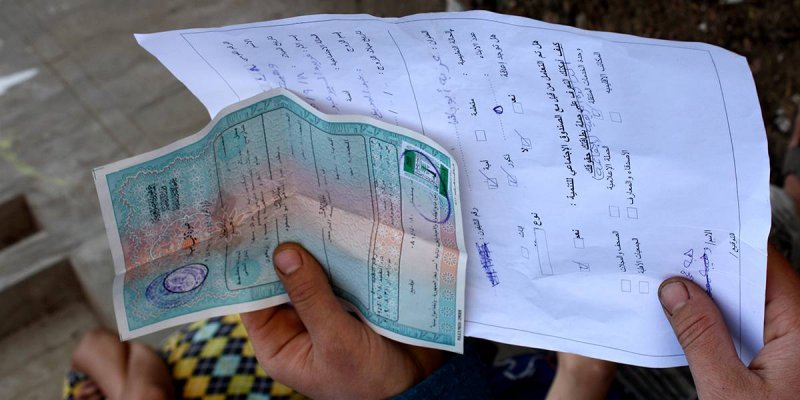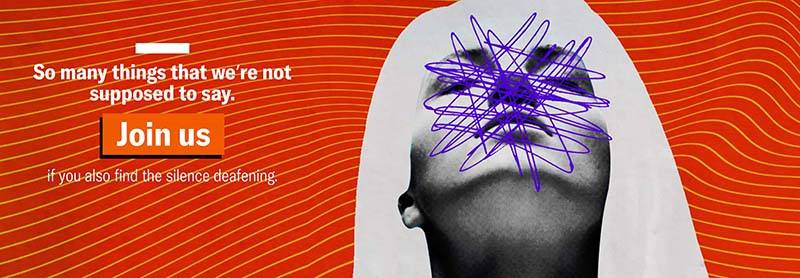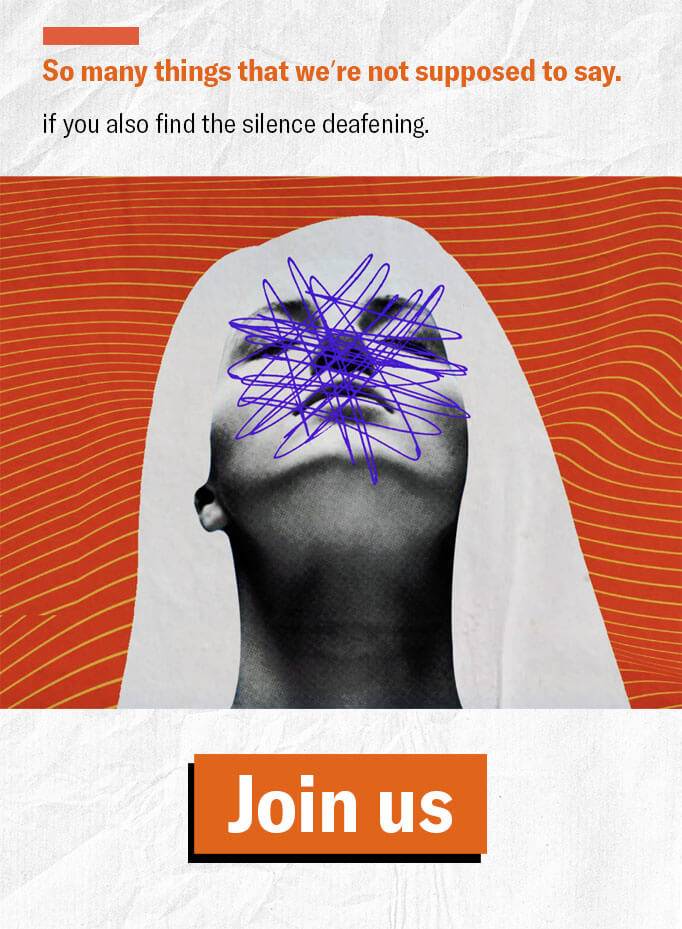"Full Lesson of Religion"

 Civil servants will not always explicitly express their objection to female applicants' new outfits. Instead, they might unnecessarily complicate the process of changing their ID photos. "I told one of the civil servants that I want to change my ID photo. When he asked me why, I told him that... it was an old [photo] and I wear the veil in it while now I don't," Al-Kadi said.
"He asked me to go upstairs to meet another civil servant. This second one refused to wrap up my paperwork… then I went to another civil servant who asked me why I took off the veil before preaching me on the hijab."
"She gave me other lessons related to marriage and how important it is not to wear makeup or earrings... She also asked me why I haven't given birth yet," Al-Kadi recalled.
The religious rhetoric prompted Al-Kadi and her mother to leave the civil service office without changing the ID photo as intended. Since then, Al-Kadi has been trying to resort to nepotism, looking for anyone who can help her amend her ID without going through the normal process.
"For now, I temporarily use my passport instead of the national ID because a photo of mine without the veil is on it," she said.
Civil servants will not always explicitly express their objection to female applicants' new outfits. Instead, they might unnecessarily complicate the process of changing their ID photos. "I told one of the civil servants that I want to change my ID photo. When he asked me why, I told him that... it was an old [photo] and I wear the veil in it while now I don't," Al-Kadi said.
"He asked me to go upstairs to meet another civil servant. This second one refused to wrap up my paperwork… then I went to another civil servant who asked me why I took off the veil before preaching me on the hijab."
"She gave me other lessons related to marriage and how important it is not to wear makeup or earrings... She also asked me why I haven't given birth yet," Al-Kadi recalled.
The religious rhetoric prompted Al-Kadi and her mother to leave the civil service office without changing the ID photo as intended. Since then, Al-Kadi has been trying to resort to nepotism, looking for anyone who can help her amend her ID without going through the normal process.
"For now, I temporarily use my passport instead of the national ID because a photo of mine without the veil is on it," she said.
"May God Guide You to the Right Path"

 "While showing curiosity and disapproval, she asked me why I had taken it off, so I asked her if her question had anything to do with my request to renew the ID. She replied in a provoking manner 'yes' before lecturing me, saying that removing the veil is religiously forbidden yet has been a trend. She also hurled prayers at me, asking God to guide me to the right path."
The civil servant refused to let Mabrouk's request to change her ID photo be met, refraining from wrapping up the requisite paperwork. When she asked another civil servant, the same thing happened; he asked her about the reasons why she stopped wearing the veil, then mentioned divine guidance and punishment for not obeying God's orders. He advised her to change her mind because "the end is near and doomsday is imminent".
However, Mabrouk was luckier than Al-Kadi, having eventually changed the ID photo after protracted debates over the way she dresses.
"While showing curiosity and disapproval, she asked me why I had taken it off, so I asked her if her question had anything to do with my request to renew the ID. She replied in a provoking manner 'yes' before lecturing me, saying that removing the veil is religiously forbidden yet has been a trend. She also hurled prayers at me, asking God to guide me to the right path."
The civil servant refused to let Mabrouk's request to change her ID photo be met, refraining from wrapping up the requisite paperwork. When she asked another civil servant, the same thing happened; he asked her about the reasons why she stopped wearing the veil, then mentioned divine guidance and punishment for not obeying God's orders. He advised her to change her mind because "the end is near and doomsday is imminent".
However, Mabrouk was luckier than Al-Kadi, having eventually changed the ID photo after protracted debates over the way she dresses.
Missing Paper
Also in the Mediterranean city of Alexandria, the treatment Fatma Hassan received from civil servants was not any different from the other two cases. She was lectured about religion and morals when she tried to change her ID photo at Sidi Gaber's civil service office. "I went to the civil service office to replace my lost ID, and thought I could also update my information; my address and photo," she narrated. "When I reached the stage when I was supposed to be photographed the female employee refused to take a photo of me and said that the old ID is still valid for another year, and the data it contains cannot be changed before the expiry date." "Even though I submitted an urgent request that does not take more than three days, my new ID was [issued] 20 days late because of many requests I had to deal with... I went to the civil service office back and forth as they kept asking me for a missing paper every time."Rough Two Months

 One of the civil servants told her that the ID photo was not hers. She replied: "Of course, it was taken while I was 17 years old and veiled."
The employee kept insisting that the ID photo was not hers, and thus she had to bring her father to confirm she was the same person.
After he was convinced that it was actually her in the photo, a female civil servant took it upon herself to preach Mahmoud, asking her how her father had allowed her to take off the veil.
Eventually, she was asked to come after two weeks. When she did, they told her to pass by again the next day, which sparked an argument.
"I was lucky because there was an inspection committee there... so the employees had to wrap up the process after I kept coming and leaving for nearly two months," Mahmoud said.
One of the civil servants told her that the ID photo was not hers. She replied: "Of course, it was taken while I was 17 years old and veiled."
The employee kept insisting that the ID photo was not hers, and thus she had to bring her father to confirm she was the same person.
After he was convinced that it was actually her in the photo, a female civil servant took it upon herself to preach Mahmoud, asking her how her father had allowed her to take off the veil.
Eventually, she was asked to come after two weeks. When she did, they told her to pass by again the next day, which sparked an argument.
"I was lucky because there was an inspection committee there... so the employees had to wrap up the process after I kept coming and leaving for nearly two months," Mahmoud said.
"This Is Forbidden and You're a Good Girl"
On the Cairo-Ismailia highway, a young female lawyer faced similar harassment at the civil service office of Madinat Al-Salam district. "I was harassed by the female civil servant who took my papers for revision," said the lawyer who requested anonymity. "She was wearing the niqab [face veil] which left me flabbergasted. How can she work for a department affiliated to the Ministry of Interior while wearing the niqab?" "While checking my documents, she asked me why I no longer put on the veil. At the beginning she was friendly." "I told her that I look prettier without it, hence her tone has changed. She told me that I needed to complete my documents and get the stamp of the Lawyers' Syndicate of which I am a member. Because I'm well aware of the law, I told her that the stamp is important only in the first time to prove that I'm a member, but it's not mandatory in the second time. She told me that I might've been expelled, so I showed her a document proving otherwise." "She later told me, 'Oh my girl, please think about the veil. This is forbidden and you're a good girl and beautiful. The hijab protects you'. I replied: 'I did think about it'."Where to File a Complaint
Brigadier General Omar Al-Gamal, the head of the public relations at the civil service office in Abbassia district, Cairo, says civilians have never filed such complaints at the Civil Status Authority. He stresses that the Ministry of Interior does not oppose any female civilian seeking to change her ID information whenever she wants and not necessarily after the expiry of her national ID card, citing the 1994 act of the civil service code. Al-Gamal said it was not reasonable for a civil servant to ask for a parent to come in person to confirm the identity of a female applicant, unless her features were completely different from the ID photo. He said such a procedure is precautionary and not compulsory as the applicant's presence is enough for her to make the desired changes to her ID. Moreover, he assured that a female civil servant cannot wear the face veil because it is prohibited by the Ministry of Interior's customs. Al-Gamal said any girl should lodge an official complaint in case she was denied her right to change her ID photo, saying civil servants who abstain from doing their jobs would be held accountable should they be proven guilty.Raseef22 is a not for profit entity. Our focus is on quality journalism. Every contribution to the NasRaseef membership goes directly towards journalism production. We stand independent, not accepting corporate sponsorships, sponsored content or political funding.
Support our mission to keep Raseef22 available to all readers by clicking here!





Join the Conversation
Anonymous user -
2 hours agoفوزي رياض الشاذلي: هل هناك موقع إلكتروني أو صحيفة أو مجلة في الدول العربية لا تتطرق فيها يوميا...
Anonymous user -
2 hours agoاهم نتيجة للرد الايراني الذي أعلنه قبل ساعات قبل حدوثه ، والذي كان لاينوي فيه احداث أضرار...
Tester WhiteBeard -
14 hours agoEgypt
Tester WhiteBeard -
14 hours agoGreat
Ayar Abdelkreem -
1 day agoكانت مكتوبة مقال رأي وتم رفضه من رئيسة التحرير،
Ayar Abdelkreem -
1 day agoكانت فكرتي